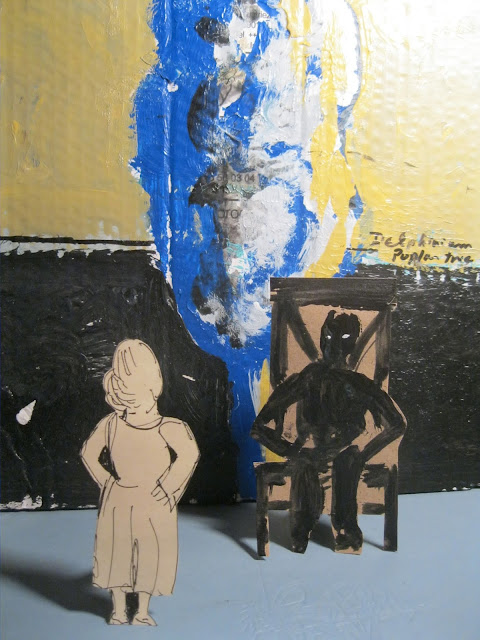No. 197. Cirque d'ennui.
It is in the fifth of e.e.cummings' six nonlectures (now & him), published by Atheneum in 1965, that the poet-lecturer, quoting from his play, Him, has his spiky, autobiographical protagonist suddenly utter cummings' infamous oath, "Damn everything but the circus!" "Him" goes on to say "and here I am, patiently squeezing fourdimensional ideas into a twodimensional stage, when all of me that's anyone or anything is in the top of a circustent...."
He is used to feel that way too. He had adored circuses. He had met the circus train and watered the Ringling Bros. & Barnum & Bailey elephants when he was twelve years old. He had collected circus books and posters. He and his childhood friends had put on backyard circuses of their own. He had viewed Cecil B. DeMille's film, The Greatest Show on Earth, twenty times.
But the circus--now politically and environmentally incorrect anyhow--had lost its savour. Just as everything else had. He could no longer bring back, even for a nostalgic moment, the cheap, exhilarating tinsel and housepaint gold, the popcorn and candyfloss, the angel aerialists, the acrid music, the weary, evacuated clowns.
Was it age? Aging seemed to be eating away at everything he once loved--the way rust eats metal.
No. 196. Photo Op.
Recently, his hitherto highly private, indeed sepulchral, career as a painter had somehow begun to gather modicum of interest, and now an art magazine had dispatched a photographer to take pictures of his recent work--and, worse luck--of him as well, often posed (though he protested only as vigorously as was consistent with getting the job done) in front of his work.
"What's this one called?" asked the beleaguered photographer, fiddling with lenses and light meters.
"Tree With Seated Figure," he said. "From 2015," he added--as if it mattered. As he sat there trying to be patient, he kept thinking about the delightful interchange between Laurence Olivier and Joan Fontaine in the early minutes of Alfred Hitchcock's film, Rebecca. Fontaine is trying to explain to Olivier that her father, who had been a painter, painted only trees. "Only one tree actually," she adds, half-embarrassed at the recollection. "The same tree over and over?" asks the amused and incredulous Olivier. "Yes, my father felt that when you had happened upon something perfect, you should stick with it!"
No. 195. Oh Tall Tree in the Eye!
"That's a big Tree," observed his neighbour Abigail--who was never above highlighting the obvious.
"It's my answer to last week's shrinking before Armageddon," he told her.
"Why so big?"
. "It's the poet Rilke," he explained. "In the first of his Sonnets to Orpheus. Rilke talks of "a tree ascended there....:"
"Where?" Abigail wanted to know.
"In the attentive, worshipful mind. Rilke described this visionary tree as Pure transcendence. Oh tall tree in the ear! "
"Or, in this case, "suggested Abigail, determined to be witty, 'a tall tree in the eye!' Rilke was a poet, after all, and not a painter."
No.194. Bird Nesting in Armageddon.
He had finished this small painting last night and then couldn't sleep at all because of the anguish it caused him. The biblical concept of Doomsday seemed all too imminent these days (how he wished it could have remained only within the annals of apocalyptic possibility), with the fat fingers of mad dictatorial man-children hovering like vultures above their red buttons. The nightmarish little painting made him feel smaller and smaller, the longer he gazed at it.
Subscribe to:
Comments (Atom)




